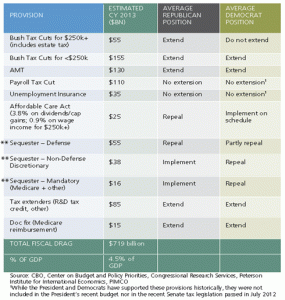November 30, 2012
“Don’t tax you, don’t tax me, tax the man behind the tree.”~Senator Russell Long
____________________________________________________________________________
Turn on the TV, Radio or surf the Internet for news and you will likely hear the pundits and politicians talking about The Fiscal Cliff and the urgency for our government to act before the end of the year. So I thought I would take some time to explain what this is all about and how it might impact the economy.
The Fiscal Cliff is simply an artificial expiration date set by Congress and the President for all of the things they were afraid to address before the election. You know, those difficult decisions they were afraid to make, so instead they agreed to “kick the can down the road” to get everyone past the election so they could be re-elected. Well that date is about to come due. So what is it that we are so frightened about? Our friends at PIMCO, the mutual fund company, recently published a table that I found to be a very useful visual in explaining what’s involved and what the impact will be to our Gross Domestic Product (GDP) if nothing is done and we are allowed to fall off the cliff:

As you can see, if nothing is done, there will be a decrease in GDP of 4.5%. With current GDP running at 2.0% (3rd qtr. 2012) we would be heading into a recession in 2013. Recessions are generally defined as two consecutive negative quarters of GDP. But that definition does not do justice to our current economic situation. Here is what Wikipedia has as their definition of a recession:
“In economics, a recession is a business cycle contraction, a general slowdown in economic activity. Macroeconomic indicators such as GDP, employment, investment spending, capacity utilization, household income, business profits, and inflation fall, while bankruptcies and the unemployment rate rise.
Recessions generally occur when there is a widespread drop in spending (an adverse demand shock). This may be triggered by various events, such as a financial crisis, an external trade shock, an adverse supply shock or the bursting of an economic bubble. Governments usually respond to recessions by adopting expansionary macroeconomic policies, such as increasing money supply, increasing government spending and decreasing taxation.”
I’ve underlined the government response because this is the crux of the real issue. What should government do to help us emerge from a recession or prevent a recession from taking hold of the economy?
(1) Increase the money supply. Already being done in excess (not a new option)
(2) Increasing government spending. Already being done. Expanded the federal government, sent outrageous amounts of money to green energy companies that have since gone bankrupt. Billions of dollars wasted that could have been spent on much needed infrastructure projects, which could have actually added to GDP.
(3) Decreasing Taxation. Already used this bullet with the Bush Tax Cuts. We are actually discussing a tax increase.
So I think it’s safe to say, the government is and has been out of ammunition for over a decade. As with most things in life, I believe in balance. I never find myself too far to the right or left but somewhere in the middle on policy and social issues, but I also believe in a balanced budget (most of the time) for myself, my clients and my government. There are times when that’s impossible and you borrow prudently with a plan to pay off the debt you incur. Trying to figure out where we will end up with the Fiscal Cliff outcome is anyone’s guess. We all know what should be done, but my job is to figure out the most likely outcome and not position our portfolios on wishful thinking.
Unless there is a “Grand Bargain” where we take a hard look at everything (taxes, Medicare, Medicaid, defense, etc.) and start from scratch (i.e. throw out the current tax code and simplify it.) and put a long term plan in place to reduce and eventually eliminate the annual deficit, so we can begin paying down the huge amount of debt we have incurred, we will most likely experience a recession in 2013.
Here is my best guess for several possible scenarios:
1. Falling off the cliff (no compromise)- reduction of 4% to 5% of GDP in 2013 – Recession
2. Some quick fix, kicking the can down the road again, 2% to 3% reduction of GDP in 2013 – Recession
3. A “Grand Bargain” is reached with long term reduction of defect and debt — 1% to 2% reduction of GDP – No growth economy- 0% GDP
If by some miracle, we get a grand bargain, and a more friendly business environment and an energy independence challenge (equivalent to President Kennedy’s “Moon Shot Challenge”) by the current administration, we could escape dipping into a recession in 2013. We could become the largest energy producer in the world by 2017 according to some global energy experts and recently published in The Financial Times.
Whenever we face very complicated and unpredictable outcomes, I am always reminded of the famous statement made by Winston Churchill in a 1939 radio broadcast about Russia:
“I cannot forecast to you the action of Russia. It is a riddle, wrapped in a mystery, inside an enigma; but perhaps there is a key. That key is Russian national interest.”
Perhaps our own national interest is the key to unlocking our own riddle, wrapped in a mystery, inside an enigma. After all, we created it, we own it and it’s ours to solve. Let’s pray we solve it quickly.
In the meantime, we are watching these events closely and mentally preparing strategies and tactics for the real possibility of a recession in 2013. We have been through many recessions before and they are usually short lived, precisely because of our own national interests. We will keep you informed of our strategies and tactics for our portfolios as these events continue to unfold.



